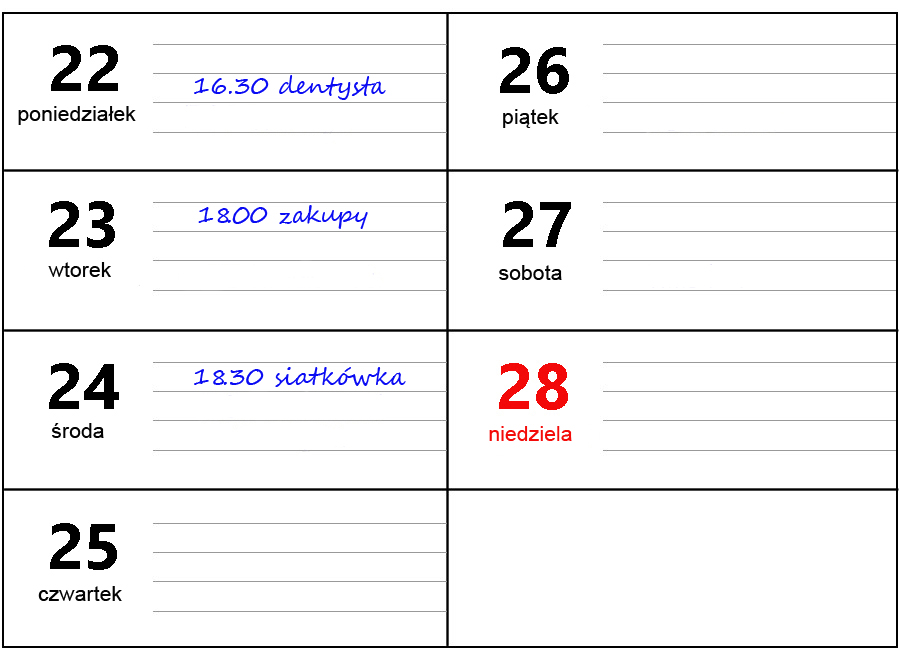Lesson 8
In this lesson, you’ll learn:
VOCABULARY AND PHRASES
- Days of the week
GRAMMAR:
- Dative case

T: Marek, kiedy gramy w szachy?
M: Kiedy Ci pasuje?
T: Może poniedziałek?
M: W poniedziałek nie mogę. Mam wizytę u dentysty… a później pomagam żonie sprzątać.
T: No to może wtorek?
M: We wtorek robię zakupy. Chcę kupić prezent mamie – w sobotę ma urodziny … Ale mam czas w środę.
T: Super. Spotykamy się u mnie czy u ciebie?
M: Może być u mnie.
T: Dobra, to umawiamy się na śro…
M: Nie.........W środę mam siatkówkę.
T: A co robisz w czwartek?
M: Właściwie nic.
T: Jesteś pewien? W takim razie czwartek. Może być szósta?
M: W porządku………..Tylko szachy pożyczyłem bratu.
|
kiedy |
when |
|
|
grać w szachy |
to play chess |
|
|
Kiedy Ci pasuje? |
When is convenient for you? |
|
|
może |
Perhaps / maybe |
|
|
wizyta |
visit / appointment |
|
|
sprzątać |
to tidy up / to clean up |
|
|
zakupy |
shopping |
|
|
urodziny |
birthday |
|
|
czas |
time |
|
|
spotykać się |
to meet (to see each other) |
|
|
u mnie |
at my place |
|
|
u ciebie |
at your place |
|
|
siatkówka |
volleyball |
|
|
właściwie |
actually |
|
|
nic |
nothing |
|
|
pewien |
sure |
|
|
tylko |
here used in the meaning but |
|
|
w takim razie |
then / in such case |
|
|
pożyczać |
to lend (used in past tense here) |
|
DNI TYGODNIA / DAYS OF THE WEEK
|
poniedziałek |
Monday |
|
|
wtorek |
Tuesday |
|
|
środa |
Wednesday |
|
|
czwartek |
Thursday |
|
|
piątek |
Friday |
|
|
sobota |
Saturday |
|
|
niedziela |
Sunday |
In order to say „on Monday” , „on Friday” and so on the preposition „w” is used alongside with accusative case. "W" is actually pronounced voiceless (like f)
|
w poniedziałek |
|
we wtorek |
|
w środę |
|
w czwartek |
|
w piątek |
|
w sobotę |
|
w niedzielę |
Dative case
In the dialogue you have encountered examples of the dative case being used.
Pomagam żonie. (I’m helping [my] wife)
Chcę kupić prezent mamie. (I want to buy a present for my mum)
This sentence could actually be formed with preposition “dla” (for) followed by the accusative, but using the dative we do not need a preposition.
Szachy pożyczyłem bratu. (I’ve lent the chess set to [my] brother.)
Related interactive test: Dative case.» take the interactive test
Word order
The Polish inflection system may be considered complicated, but the advantage is that it gives more flexibility to the language. Noun endings indicate case very clearly, so there are many possible ways to arrange words in a sentence. It depends what we’d like to stress.
1.Daję parasol mamie. This is the most natural and neutral way of saying I am giving the umbrella to my mother.
However there are also other options:
2.Parasol daję mamie.– The umbrella seems the most important here, so we can put it in the beginning.
3.Mamie daję parasol. – Here, the mother (the recipient) is the most important.
Related interactive test: Dative or Accusative.» take the interactive test
Related interactive test: All cases mix – which case is it?.» take the interactive test
Related interactive test: All cases mix – write the correct form.» take the interactive test
Related interactive test: Revision - lesson 8.» take the interactive test
 LearnPolish
LearnPolish